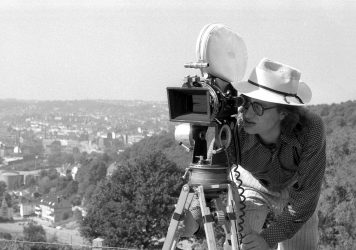Wim Wenders' gentle character studies features a beautifully restrained performance from Kôji Yakusho, as a toilet cleaner who lives a simple life in Tokyo.
Not a word is uttered within the first ten minutes of Wim Wenders’ Perfect Days. We watch as Hirayama (Kôji Yakushi) goes about his daily routine, listening to music in his van as he drives to his job as a toilet attendant in Tokyo. The ambient sounds of the city fill the gaps where dialogue would normally reside until Hirayama’s peace is disrupted by the arrival of his younger and decidedly louder colleague Takashi (Tokio Emoto) who doesn’t take the same pride in his work. He’s more interested in chasing girls and trying to get off work early.
But despite his irritation registering in the microscopic movements of Yakushi’s visage, Hirayama never lets on. He has an almost otherworldly serenity about him, exhibiting kindness towards strangers, and living his life dictated by routines. He is shown to have a keen interest in nature, gently cultivating saplings and photographing the trees he sees throughout his day. Franz Lustig’s vibrant cinematography captures the way that nature and urbanism intersect within Tokyo, and how the two exist in a strange sort of harmony.
We learn more about Hirayama’s life in snippets and glimpses – despite not saying much, it’s clear he has bonds with many people around him, from the owner of a local restaurant to the bookseller who passionately discusses Patricia Highsmith with him. Wenders’ own musical taste inspired the film’s classic rock soundtrack, and the familiar sounds of The Velvet Underground, Nina Simone and Otis Redding – among many others – connect Hirayama to the wider world while providing a glimpse into his personality beyond the orderly, sparse apartment he keeps. Later, encounters with people from his past reveal there’s much more to Hirayama than meets the eye, but Wenders, the master of the poetic slow burn, never gives us all the answers.
It’s a film of profound gentleness, both towards Hirayama and in the way he treats those around him. When his brash colleague can’t afford to take his girlfriend out, it’s Hirayama who gives him the money. His taciturn nature seems to move others to share their secrets with him – and there’s a sense he will dutifully keep them. But while the film is as guarded as Hirayama himself, its economical style makes it all the more engrossing. A titan of Japanese cinema, Kôji Yakushi delivers a sublime central performance, able to convey everything in a single glance or movement of his face. The film’s stunning final sequence is perhaps the biggest testament to his acting talent, an extended take that lingers longer after the credits roll – it’s little wonder he won Best Actor at Cannes Film Festival in 2023 for his performance.
More than anything, Perfect Days reminds us how fortunate we are to live at the same time as Wim Wenders, a filmmaker of extraordinary technical ability, but also possessing a true poetic spirit. Whether he’s turning his keen eye to documentary or fiction, he encourages us to pause and reflect on the details of the world around us – no easy thing in a world as bustling and overstimulating as ours. This small marvel, made with such reverence for Tokyo and Japan more broadly, is a fine example of this commitment to the beauty of the mundane.
In Perfect Days, every tiny leaf, every turned page of a novel, is worthy of our attention, unexpectedly bringing to mind the words of Matthew Broderick in Ferris Bueller’s Day Off: “Life moves pretty fast. If you don’t stop and look around once in a while, you could miss it.” Perfect Days encourages a sort of radical presentness in our own lives – learning how to truly connect with our existence, even when it’s difficult or causes us to confront unpleasant truths. This is the only way we can hope to really be a part of the world we live in. What could be more perfect than that?
Published 22 Feb 2024
Wim's recent films have been a bit underwhelming, but never count him out.
He's back! With a magnificent Kôji Yakusho.
A poetic, beautifully balanced character study.

Wim Wenders’ luxe 3D portrait of the flame-thrower wielding conceptual artist Anselm Kiefer is a dreamy delight.

The German multi-hyphenate on how he’s future-proofing classics like Wings of Desire and Paris, Texas.

How the Oscar-nominated Perfect Days sees the globe-trotting German filmmaker in unison with his surroundings in the Japanese capital.